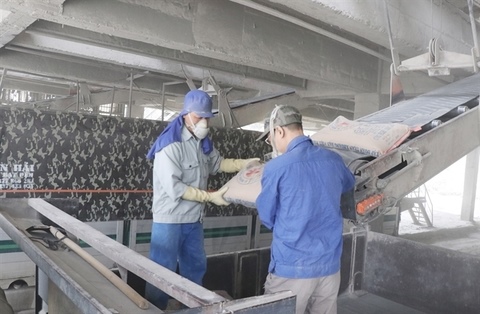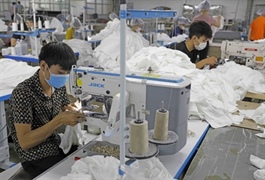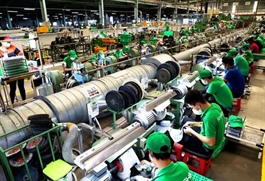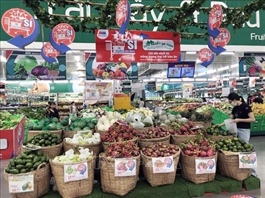Building material enterprises find ways to overcome difficulties
Building material enterprises find ways to overcome difficulties
Enterprises in the building material sector are looking for ways to overcome current challenges due to the frozen real estate market.

Cement being packed at a VVMI La Hiên Cement JSC factory. — VNA/VNS Photo Hoàng Nguyên |
Đinh Hồng Kỳ, vice chairman of Việt Nam Association for Building Materials, said that construction material companies had encountered numerous difficulties, and many had to stop operations as property project construction stagnated.
Even when businesses had foreseen these difficulties, their revenues still declined sharply. That forced many of them to restructure production activities and minimise the workforce, with losses being inevitable, Kỳ said.
Trần Duy Cảnh, Director of Thanh Phúc Mechanical and Construction Materials Company said that the unit was struggling to survive month by month.
Although his firm had 35 years of experience in the construction materials industry, Cảnh said that this was the most difficult time and his company had failed to find direction. He said competition in the local market was fierce because there were no new real estate projects while the number of construction material firms was large.
Construction ceramics and tiles were mainly used for housing projects and civil construction projects, so when the real estate market faced difficulties, enterprises encountered challenges selling these products, Cảnh said.
He added that the consumption of these items depended on the construction, repair, and renovation of people's houses. But production and consumption only reached about 50 per cent of designed capacity.
A representative from Secoin, a manufacturer and exporter of high-end artistic bricks and tiles, said that amid the slumping demands in both international and domestic markets, his firm had to shift to selling products for residential customers through dealer systems.
At the same time, it also focused on public investment projects, especially highway and airport ones.
Cement providers also faced a similar situation.
The Việt Nam Cement Corporation (VICEM), a State-owned enterprise accounting for a 36 per cent share of the domestic market, has announced a loss of over VNĐ500 billion (US$20.4 million) in 2023.
VICEM General Director Lê Nam Khánh described 2023 as an unprecedentedly difficult year. Influenced by the world situation and the real estate market, which had not shown signs of recovery, cement supply far exceeded demand. Meanwhile, raw material and fuel prices for inputs for cement production remained high.
Khánh said domestic and export cement consumption also decreased and inventories also increased. Some VICEM factories had to reduce productivity, affecting his firm's production and business efficiency.
Meanwhile, the Việt Nam Glass Association said the sector's revenue in 2023 decreased by 70-80 per cent compared to 2022, marking a long and continuous period of decline.
According to experts, in the current context, the recovery of the domestic market was a must. Besides, focusing on removing difficulties for the real estate market and promoting the disbursement of public investment capital would also be an important and indispensable solution.
Earlier, the Ministry of Construction had proposed reductions of taxes and interest rates, together with measures to promote the use of building materials in the context that the industry, especially cement, has had the most difficult year in a decade.
In order to support the building material industry to overcome the difficult time, the ministry also proposed increasing the use of cement in infrastructure projects.
Specifically, the Ministry of Transport should ask investors to use reinforced concrete viaducts for highway projects that were being designed, especially in areas of weak soil and lacking road base materials such as the Mekong River Delta.
Localities should increase the use of cement in road construction.
In addition, the policy of reducing value-added tax by two percentage points should be extended.
The ministry also proposed policies be raised to encourage deep processing and promote exports.
The construction ministry urged the Ministry of Industry and Trade to launch anti-dumping investigations on several products that saw significant increases in imports.
Producers should actively improve their competitiveness, diversify products, renovate production technologies and expand export markets, the ministry said.
Nguyễn Quang Hiệp, Deputy Director of the Building Materials Department under the Ministry of Construction, called for greater attention to developing the urban infrastructure system, transport infrastructure and drainage systems, as well as removing difficulties for the housing market.
The export tax on clinker should be kept at 5 per cent instead of 10 per cent for at least the next two years, he said.



























